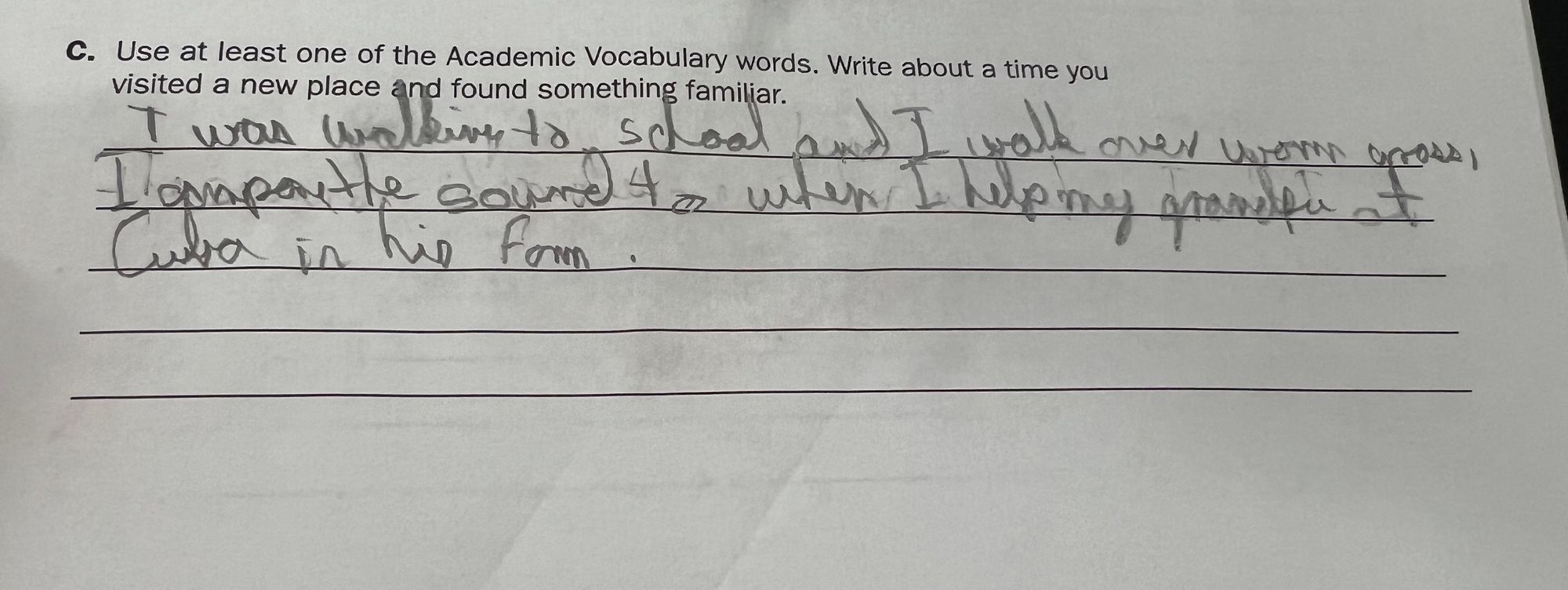Teaching in Tampa's Transformation Network – defeat and hope

Teaching, perhaps more than any other career, can transform a child’s life. So it deserves the attention it gets in our country. The questions that surround education are serious, though. Are teachers under-resourced, or not? Should parents have more power in public education, or not? More censorship in schools, or not? In the midst of these debates, we must not forget what we all agree on: teachers are important. Very. Through education, mentorship, leadership, and consistent support, teachers in the U.S.–and around the world–are playing formative roles for our kids. After I substitute taught this past year, I’ve recognized this value more than ever.
One thing I didn’t fully appreciate about the profession before I started subbing is this: the teaching experience is heavily dependent on the type and location of school a teacher teaches at. This is one of the things that complicates the process of monetarily valuing teachers, measuring parental support, and standardized testing so much. For example, the basic responsibility of a 7th grade English teacher in two different middle schools will be pretty much the same: teach 7th grade English content. In practice, however, there are many nuances that complicate this responsibility. One may teach in a rougher, central city area. The other teaches in a high socioeconomic status suburb. The former consistently deals with significant behavior. This teacher is going to need a different skill set (or rather, an additional set of skills) to be successful in comparison to the latter teacher. Language barriers are also more likely to be an issue in the first school, affecting things even more. “Teaching,” even if it’s the same subject, can look and feel very different. And based on my experience, it’s a significant reason why some teachers would feel highly satisfied, and others the opposite.
I’ve come to acknowledge these differences and be concerned by them as I’ve taught the same subject to the same ages at different schools in different locations. The example of 7th grade English was not hypothetical. This also served as a constant variable for one of my comparisons. When I subbed for my home middle school in rural southeast Ohio, I had a great experience. The students, by and large, behaved really well. They listened to me when I led a lesson about characterization, and they worked quietly on their assigned reading. At the end of the day, I did not feel overly tired or worn. In fact, I felt like the day went fast. When I moved to Tampa, FL in the winter and taught 7th grade English at an inner city transformation school, my experience was very different (the “transformation” label indicates that the school has been under-performing. Read more about these schools in this Tampa Bay Times article). The lesson plans this day–work on a one-page front/back handout about Thurgood Marshall. They were to summarize, or “chunk,” each paragraph of the reading and answer multiple choice questions about it. Simple, right? No. Nothing was simple that day. To start, in the first period, it took me over 10 minutes to get the students to put away their phones and place their backpacks at the front of the class–a school policy. After that, attendance was a chore because the students didn’t listen and continued to talk. They did let me explain the lesson plan and do an example, but once everyone had their assignments, it felt like a lost cause. Students, plain and simple, did not care. I’d estimate that at least 50% of each class did not get much further than their name and the example I provided. They may have chunked one more paragraph. 25% got a little bit more done than that. No more than 10% of the students were working on the assignment the whole time. I don’t think more than one or two students, in the entire day, completed the assignment (which, believe me, was very possible).. During one class change there was a fight in the courtyard, and wow, when I tell you I’ve never seen an environment transform so fast. As soon as it began, kids were absorbed into the drama. Heaven knows it was the most exciting part of their day at school.
It was a wholly different academic culture than I had experienced at any point in my life. Not only was there such a salient disinterest in learning, there was also an uncomfortable distaste for structure and instructions. I was presented with a powerful lack of respect for the school and authority at large. I spent much of the day going around the room, encouraging students to try. I tried to understand what was behind their lack of effort. Did they understand the instructions? Did they need to move to a different part of class, away from their current distractions? Did they need more examples? I felt bad for the couple kids that did try. And I felt bad for the kids who didn’t try. After all, it was themselves that they were affecting the most. It may not seem like it, but simple assignments, like the one they were tasked with, were healthy for their minds and development. School is a training gym for our brain. What good would it be to go to the weight room and just stand there and look at the weights, never actually lifting them? This isn’t that much different. By giving effort, a student learns how to approach life. By performing, they give themselves opportunities for their future. By learning, they just set themselves up for success in general. For those that did try, it was difficult, because the environment was not supportive of them. When people are talking, disruptive, or disrespectful in any sense, it makes it harder to work. Despite my best efforts, the classroom culture did not support the students who did the assignment. Did I reach out for help? I tried. I called the office about three to four times that day when I felt like behavior was getting out of hand and I couldn’t reel it in to some amount of order. Each time the line was busy.
When the day ended, I felt defeated. It had been worse than any other teaching day. I wanted to learn from it, though. I reflected, and I thought about all of the factors that combine to create an unproductive and unsuccessful classroom culture like this. I thought about each student’s personal life. What was it about their backgrounds that make them act like this? Does anyone encourage school at home? Stressful family situation? How are they raised? What have their past educational experiences looked like? Are their basic needs being met on a regular basis? The more I thought about these things, the more I felt that the classroom itself was simply a reflection, or a manifestation of the lives many of these students lived outside of school.. Did it really matter who you had as the teacher and what resources they had? With the troubled pasts that some students bring into that room, is there only so much any teacher could do? It almost feels like you are set up for failure. How does a transformation school like this rise up? With the social and cultural factors at play in the surrounding neighborhoods, how can we try to address these too? Politics, government, nonprofits, charities, businesses, churches–must it take contributions from all of these, and not just the education system? I felt a new compassion for both the students and the teachers, and I felt even worse when I considered the landscape of our country. I thought of all the cities across the U.S., each with their own underserved areas, with schools that could be similar.
These were the thoughts and context I took with me the next time I subbed at a different middle school, not too far from the previous school, with the same subject one grade younger. This school looked similar from the outside. I didn’t look, but I assumed this school was also within the transformation network, so I mentally prepared myself for what the day might look like. I’d need to be harder at first. I wasn’t going to be pushed around. I would be more intentional about getting support if it was necessary.
The teacher left very detailed lesson plans–quiz, vocab assignment on their book about Harriet Tubman (another famous black historical figure–”interesting” I remember thinking.. For all the attention Florida public schools get, you almost get the impression famous black figures were just being removed from curriculums. That was not the case and it was nice to see.) The quiz was to be done independently and silently, and the vocab could be with partners. It was also written on the board. The classroom was neat, there was a seating chart, and there was a written note on how to deal with behavior: write down names if students cause problems. For minor incidents, send them to Mrs. T across the hall. For serious issues, call the administration. Not too long after I read all this, a different neighbor teacher introduced himself and told me to let him know if students cause problems. This was impressive support, and I was feeling good.
The bell rang, and I greeted my students as they arrived. I introduced myself and the lesson plans (with ‘Kudlapur’ spurring the usual amused reaction). Then I mentioned, “Based on the plans, it looks to me like Mrs. L runs a pretty tight ship, and we’ll keep it that way.” One of the students said, eyes wide and head nodding, “PRETTY? Pretttty..” That made me laugh. After attendance, I made it clear what I’d do with behavior issues. I’ll write your name down. Still issues, send across hall to Mrs. T “Nooo, noo!” Mrs. T had a reputation. The students did not want to deal with her. She had a significant influence. Yet, as I realized after I wrote one student's name down after she called someone ‘autistic,’ so did the teacher I was subbing for. Students did not want to be on the list. So, they behaved. Still, I was amazed when we started the quiz. The class was actually quiet, and students worked independently. They were doing what they were told! It wasn’t just this class. Every class, after the initial excitement of the period change, behaved. I didn’t write any names down at all after 1st period. I was proud of the students, the teacher I was subbing, the teacher across the hall, the administration, of everyone. Students were putting in effort with their schoolwork. Did everyone finish the quiz and the vocab. No. Did everyone try? Yes. I had fun with them, too. I love talking with students, so when they were done with their quiz, we had some nice chats. One student lit up like a bonfire when I asked him about his Jojo manga book. Another was proud of their drawings. One student randomly told me as they walked out of the room, “You are the best sub I ever had.” ‘Hahaha, what??’ I thought. The only thing I did for that student was let them run something to the office.
At the end of the school day, I ran into one of the principals. I shared with him some of my thoughts–the day went well, kids behaved nicely, the last transformation school I subbed at, and how I was struck by some of the differences. Was this a transformation school, I asked? “No, but it’s this close.” He said intensely, as he held up his thumb and index finger. “We could almost be considered one.” He was a charismatic, young individual, and he mentioned that the school has come a long way and the students are from the same neighborhoods as the students from the other school I mentioned. I went home and continued to reflect on this. I was so encouraged. Two schools, same demographics, same neighborhoods, and probably similar resources. Yet, different outcomes. The classroom at the first school– a lack of respect for learning and authority. In a similar classroom at the second school, the opposite. Contrary to my previous thoughts, a teacher is not necessarily set up for failure. I felt that a team of administrators and staff does have the ability to turn around a school. Home life and background baggage does not need to doom a school. Of course, it will make things more difficult. But this experience gave me hope. There is hope to change an academic culture. No set of students are lost. Teachers and administrators have the ability to improve their educational progress and future. How exactly? I still don’t really know. Discipline is an important component, but I know it goes beyond that. The structure, the trust, the support. Teachers, too, can benefit mentally and emotionally from these improvements. Public education still has the opportunity to transform student’s lives, and it doesn’t have to be isolated to certain areas.



